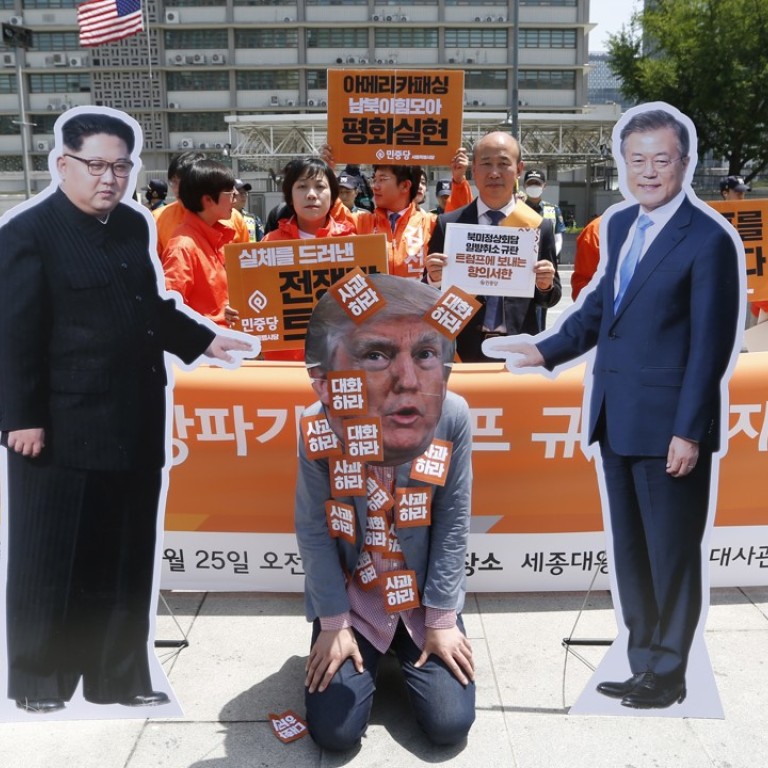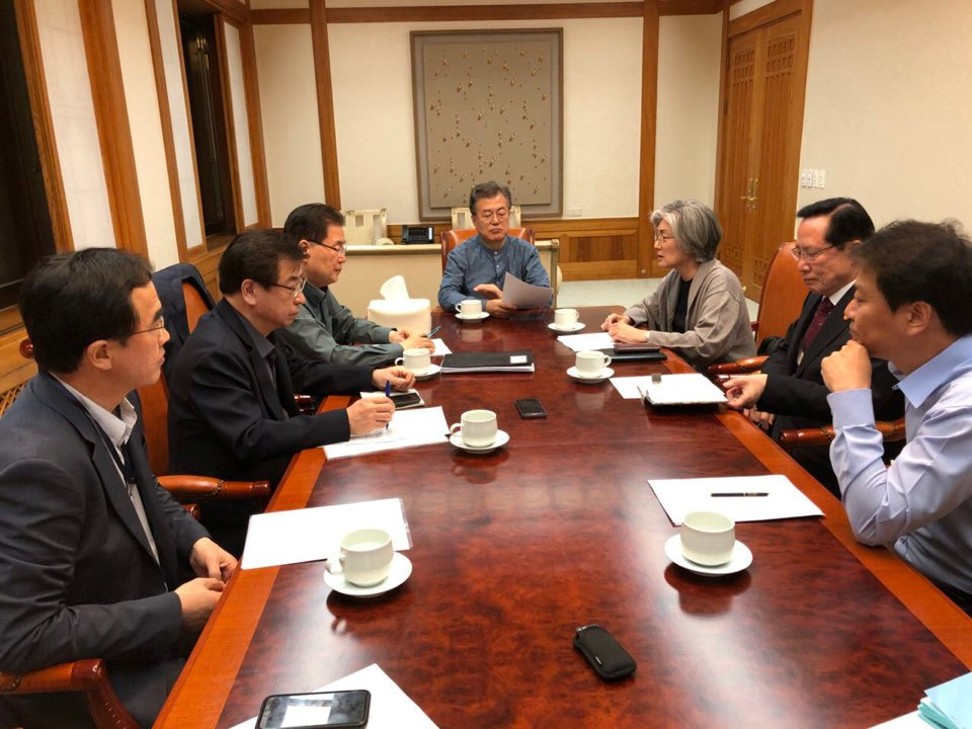
Caught off guard by summit collapse, Seoul tries to play down impact
Donald Trump’s decision to call off meeting with Kim Jong-un seen as setback for South as it tries to be mediator, but a win for China
US President Donald Trump’s abrupt cancellation of a planned summit with North Korean leader Kim Jong-un caught Seoul off guard and is a setback for the South as it tries to position itself at the centre of negotiations, analysts say.
Seoul had been trying to play the role of mediator, calling last month’s inter-Korean summit a stepping stone for the Trump-Kim meeting planned for June 12 in Singapore. Dialogue between Seoul and Pyongyang to resolve the crisis on the Korean peninsula was to be followed by the talks between Kim and Trump, and a trilateral meeting with the US. China would be brought in at a later stage, a plan analysts said was aimed at minimising Beijing’s influence over the process.
Seoul at one point even suggested the Trump-Kim summit be held at the border truce village of Panmunjom, and its national security adviser Chung Eui-yong, aboard South Korea’s Air Force One to Washington early this week, said there was a “99.9 per cent” chance it would happen, although there were signs then that it might not go ahead as planned.
Even on Tuesday, when South Korean President Moon Jae-in met Trump in Washington, Seoul officials were still expecting the meeting to happen. But Trump announced on Thursday that the plan was off, saying the “tremendous anger and open hostility” from Pyongyang made it inappropriate to hold the talks. Moon told an emergency national security meeting on Friday that he regretted the move and was perplexed by Trump’s decision.

Lee Seong-hyon, a research fellow at the Sejong Institute in Seoul, said the summit’s collapse was a “setback” for the South even though the negotiations were not over yet, and that China appeared to be a winner in the fallout.
“China has been anxious about the fast-changing and improving relations between Pyongyang and Washington,” he said. “For the time being, China would prefer a stable status quo in the region, with North Korea on its side.”
South Korean lawmakers and officials on Friday tried to play down the impact of the summit being called off, saying both Trump and the North had stressed that the possibility for dialogue was still open.
Baik Tae-hyun, a spokesman for Seoul’s unification ministry, said the “[South Korean] government would continue to make diplomatic efforts to maintain the momentum for dialogue”.
Moon Hee-sang, a South Korean lawmaker with the ruling Democratic Party of Korea, also said the North would still seek to normalise relations with Washington through the South.
“The recent mood of rapprochement on the Korean peninsula will continue. Paradoxically, I think inter-Korean relations will improve as they can only rely on us, since we are willing to act as a mediator,” Moon said.
“So at this point, South Korea’s position on holding trilateral talks after the direct meeting between Trump and Kim is likely to remain unchanged.”
Kim Yong-hyun, a professor of North Korean studies at Dongguk University in Seoul, said Pyongyang needed Washington for its economic development, as its ultimate goal was to become a normal state.
“Improving relations with Beijing would help, but that is not enough for them to achieve economic prosperity. It is difficult to develop an economy without fundamentally improving the relationship with the United States,” Kim said.
But a South Korean parliamentary source, who asked for anonymity due to the sensitivity of the issue, acknowledged that Seoul had a difficult journey ahead.
“The method of denuclearisation still remains vastly different [between Washington and Pyongyang]. It is hard for Pyongyang to give up its phased and synchronised measures to denuclearise,” the source said.
While Washington wants an “all-in-one” approach where it provides economic compensation after it demonstrates complete denuclearisation, Pyongyang would prefer “phased and synchronous” measures, where economic sanctions are partially lifted during the process of dismantlement.
“It will not be easy for Seoul to mediate between the two sides who want something very different,” the source said. “Especially in Pyongyang’s case, it’s a matter of regime security – and I doubt they will compromise their regime security to reach a deal.”
Additional reporting by Grace Tsoi

